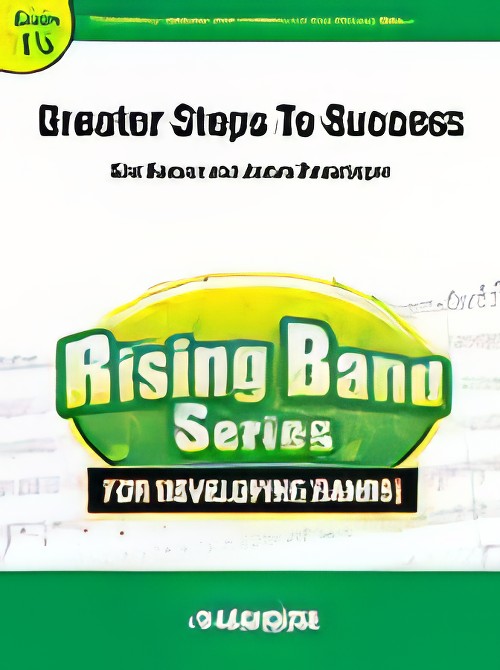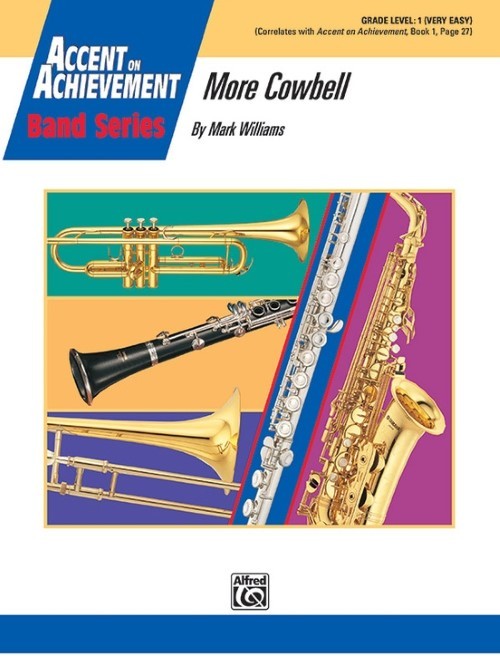Results
-
 £132.50
£132.50Grevling i taket - Øystein Dolmen og Gustav Lorentzen
This is an arrangement which has to be performed a bit humorous in the spirit of the original.It starts with a kazoo-like opening, played on the mouthpieces. At C, flutes and clarinets should stand up. Maybe the musicians can play it by heart?Two bars before D, the tempo increase. On E, the trumpet players should stand (and play by heart)?New, even higher tempo two bars before F. The trombonists should stand up in bar 103 to prepare for a terrific tempo. But G will be played like a laidback reggae-version. The saxophonists can stand up simultaneous with the glissando in bar 120.The tempo at H should be high and fresh and with several sections standing. In bar 158 should almost all players sit. At bar 160 everyone should stand up.In bar 162, all players should turn to the audience during the crescendo.
Estimated delivery 7-14 working days
-
£248.99
Odysseia - Maxime Aulio
Washed up on the Phaeacian shore after a shipwreck, Odysseus is introduced to King Alcinous. As he sits in the palace, he tells the Phaeacians of his wanderings since leaving Troy. Odysseus and his men fi rst landed on the island of the Cicones wherethey sacked the city of Ismarus. From there, great storms swept them to the land of the hospitable Lotus Eaters. Then they sailed to the land of the Cyclopes. Odysseus and twelve of his men entered the cave of Polyphemus. After the single-eyed giantmade handfuls of his men into meals, Odysseus fi nally defeated him. He got him drunk and once he had fallen asleep, he and his men stabbed a glowing spike into the Cyclop's single eye, completely blinding him. They escaped by clinging to the belliesof some sheep. Once aboard, Odysseus taunted the Cyclop by revealing him his true identity. Enraged, Polyphemus hurled rocks at the ship, trying to sink it. After leaving the Cyclopes' island, they arrived at the home of Aeolus, ruler of the winds.Aeolus off ered Odysseus a bag trapping all the strong winds within except one - the one which would take him straight back to Ithaca. As the ship came within sight of Ithaca, the crewmen, curious about the bag, decided to open it. The winds escapedand stirred up a storm. Odysseus and his crew came to the land of the cannibalistic Laestrygonians, who sank all but one of the ships. The survivors went next to Aeaea, the island of the witch-goddess Circe. Odysseus sent out a scouting party butCirce turned them into pigs. With the help of an antidote the god Hermes had given him, Odysseus managed to overpower the goddess and forced her to change his men back to human form. When it was time for Odysseus to leave, Circe told him to sail tothe realm of the dead to speak with the spirit of the seer Tiresias. One day's sailing took them to the land of the Cimmerians. There, he performed sacrifi ces to attract the souls of the dead. Tiresias told him what would happen to him next. He thengot to talk with his mother, Anticleia, and met the spirits of Agamemnon, Achilles, Patroclus, Antilochus, Ajax and others. He then saw the souls of the damned Tityos, Tantalus, and Sisyphus. Odysseus soon found himself mobbed by souls. He becamefrightened, ran back to his ship, and sailed away. While back at Aeaea, Circe told him about the dangers he would have to face on his way back home. She advised him to avoid hearing the song of the Sirens; but if he really felt he had to hear, thenhe should be tied to the mast of the ship, which he did. Odysseus then successfully steered his crew past Charybdis (a violent whirlpool) and Scylla (a multiple-headed monster), but Scylla managed to devour six of his men. Finally, Odysseus and hissurviving crew approached the island where the Sun god kept sacred cattle. Odysseus wanted to sail past, but the crewmen persuaded him to let them rest there. Odysseus passed Circe's counsel on to his men. Once he had fallen asleep, his men impiouslykilled and ate some of the cattle. When the Sun god found out, he asked Zeus to punish them. Shortly after they set sail from the island, Zeus destroyed the ship and all the men died except for Odysseus. After ten days, Odysseus was washed up on theisland of the nymph Calypso.
Estimated delivery 7-14 working days
-
 £104.99
£104.99Prelude and Polonaise - Nikolai Rimsky-Korsakov
Nikolai Rimsky-Korsakov (1844-1908) composed his opera The Night before Christmas in 1894-95. The premiere took place on December 10 1895 in St. Petersburg. The libretto to the opera came from Rimsky-Korsakov himself and is based on a tale by Nikolai Gogol, which some years earlier had already served as operatic material for Pjotr Tchaikovsky. The opera tells the story of Vakula, the blacksmith of a small Ukranian village. He is madly in love with Oxana who demands - as proof of his love - a most unusual Christmas present: the magnificent slippers of the Empress. Knowing full well that, in normal circumstances, he would never be able to fulfil Oxana's wish, Vakula seekssupernatural assistance and finds it in the shape of the devil, who comes up with a ploy to help him. The devil carries him on his back to St. Petersburg, where during a lavish reception at court Vakula finds an opportunity to present his request to the empress. The Empress actually agrees to Vakula's wish and hands over her slippers to him. Thereupon he returns to his own village. Here, in the meantime, he had been given up for dead, and Oxana had been plunged into great sorrow as she had come to realise that she also truly loved Vakula. In the end, however, all misunderstandings are resolved and all adversities overcome: Oxana receives her extravagant present, the lovers are united, and the church bells call the villagers to the Christmas service.The vibrant Polonaise is played in the 3rd act of the opera at the entrance of the Empress, whose appearance is anticipated in the prelude by the fanfare motives. The music paints a vivid picture of the party atmosphere and the marvellous dcor at the imperial court of St. Petersburg, which Rimsky-Korsakov conjures up in his opera and which can also be played outside of the Advent and Christmas season, for example as an opening piece to any festive concert.
Estimated delivery 7-14 working days
-
 £179.50
£179.50Celebration for Band - John Brakstad
Many Norwegian bands have grown up around factories, but Norwegian factories are often located in the countrysides - by a fjord or lake, by a river or waterfall that provided power for the factory. The factory was the foundation for the existence of the community, but it was also essential for the community's cultural life, choirs, bands etc. (cp. British brass bands and mining). "Celebration for band" tries to give a picture of the environment and life around a band like this, with both factory noise and the natural world (Pastorale), as well as the challenges and development of the band itself. The composition is built up of five connected episodes: - Fanfare and Prologue (concludes with a feeling of the untamed power of the river) - Pastorale I: " At the river" - Intermezzo: " The Factory" (starts with the opening of water for the turbines: snare drum. Factory whistle and bell call to work, and the spinning and weaving machinery starts up.) - Pastorale II: " Summer evening on the fjord." - Finale: " Challenge and Progress"
Estimated delivery 7-14 working days
-
£154.90
Summer Dances - Adam Gorb
'Summer Dances' is a joyful work in three short movements celebrating my favourite season where people are happiest outdoors. Each movement is a celebration the first movement 'Summer Day' celebrates the open air, with a bold and arrogant melody in 10/8 time, whose rhythm dominates the movement. The next movement 'Summer Night' could be described as a 'Beach Habanera' led by a sensuous trumpet melody. The movement ends with an ambiguous harmonic build-up, which is resolved at the start of the finale 'Summer Party' with a folk like theme that is passed round the ensemble, building up, (with suggestions of the first movement theme) to a riotous and festive ending. Summer Dances was commissioned by HAFABRA Music, Louis Martinus in collaboration with Biblioservice Gelderland/Music department MUI, Arhnhem, the Netherlands. Regarding interpretation suggestions: Movement 1) Lively but not too fast very much a piece for the full ensemble, up until the final six bars when things become more subtle and intimate maybe sunset.... Movement 2) Very laid back and sexy. The movement should be thought of as a wonderfully promising 'first date' or 'wedding night', with great possibilities with the unresolved chord at the end of the movement.... Movement 3) As fast as is comfortably possible. The start should be delicate and chamber music like, but increase in general excitement, particularly from figure 31. Something should be saved up for a true fortissimo at 34.
Estimated delivery 7-14 working days
-
 £49.00
£49.00Greater Steps to Success (Concert Band - Score and Parts) - Benson & Swearingen
Create a routine that will instill a lifelong understanding of why warming up is important and carry over from group to individual practice. This quick, yet highly efficient warm up is a perfect way to start your rehearsal. Students will instantly become more focused as you transition into your valuable rehearsal/teaching time. Kim Benson and James Swearingen, two well-respected music educators, have teamed up to make your instruction more effective, your musicians stronger and your program highly successful. A must-have for today's approach to teaching instrumental music!
Estimated delivery 7-14 working days
-
 £248.99
£248.99Odysseia (Concert Band - Score and Parts) - Aulio, Maxime
Washed up on the Phaeacian shore after a shipwreck, Odysseus is introduced to King Alcinous. As he sits in the palace, he tells the Phaeacians of his wanderings since leaving Troy. Odysseus and his men fi rst landed on the island of the Cicones where they sacked the city of Ismarus. From there, great storms swept them to the land of the hospitable Lotus Eaters. Then they sailed to the land of the Cyclopes. Odysseus and twelve of his men entered the cave of Polyphemus. After the single-eyed giant made handfuls of his men into meals, Odysseus fi nally defeated him. He got him drunk and once he had fallen asleep, he and his men stabbed a glowing spike into the Cyclop's single eye, completely blinding him. They escaped by clinging to the bellies of some sheep. Once aboard, Odysseus taunted the Cyclop by revealing him his true identity. Enraged, Polyphemus hurled rocks at the ship, trying to sink it. After leaving the Cyclopes' island, they arrived at the home of Aeolus, ruler of the winds. Aeolus off ered Odysseus a bag trapping all the strong winds within except one - the one which would take him straight back to Ithaca. As the ship came within sight of Ithaca, the crewmen, curious about the bag, decided to open it. The winds escaped and stirred up a storm. Odysseus and his crew came to the land of the cannibalistic Laestrygonians, who sank all but one of the ships. The survivors went next to Aeaea, the island of the witch-goddess Circe. Odysseus sent out a scouting party but Circe turned them into pigs. With the help of an antidote the god Hermes had given him, Odysseus managed to overpower the goddess and forced her to change his men back to human form. When it was time for Odysseus to leave, Circe told him to sail to the realm of the dead to speak with the spirit of the seer Tiresias. One day's sailing took them to the land of the Cimmerians. There, he performed sacrifi ces to attract the souls of the dead. Tiresias told him what would happen to him next. He then got to talk with his mother, Anticleia, and met the spirits of Agamemnon, Achilles, Patroclus, Antilochus, Ajax and others. He then saw the souls of the damned Tityos, Tantalus, and Sisyphus. Odysseus soon found himself mobbed by souls. He became frightened, ran back to his ship, and sailed away. While back at Aeaea, Circe told him about the dangers he would have to face on his way back home. She advised him to avoid hearing the song of the Sirens; but if he really felt he had to hear, then he should be tied to the mast of the ship, which he did. Odysseus then successfully steered his crew past Charybdis (a violent whirlpool) and Scylla (a multiple-headed monster), but Scylla managed to devour six of his men. Finally, Odysseus and his surviving crew approached the island where the Sun god kept sacred cattle. Odysseus wanted to sail past, but the crewmen persuaded him to let them rest there. Odysseus passed Circe's counsel on to his men. Once he had fallen asleep, his men impiously killed and ate some of the cattle. When the Sun god found out, he asked Zeus to punish them. Shortly after they set sail from the island, Zeus destroyed the ship and all the men died except for Odysseus. After ten days, Odysseus was washed up on the island of the nymph Calypso.
Estimated delivery 7-14 working days
-
 £48.95
£48.95More Cowbell (Cowbell Feature with Concert Band - Score and Parts)
More Cowbell was inspired by the famous television skit featuring a rock band, a record producer, and an over-zealous cowbell player. If the cowbell player is good at hamming it up (and rocking out!), you could try the following staging suggestions: Cowbell player plays with intensity and lots of movement, and starts moving in measure 17 toward the front of the band, ending up next to the conductor in measure 24, bowing to the audience on beat 4. Conductor gives a stern look and gestures to student to get back in the percussion section (possibilities: "slit throat" gesture with side of first finger followed by pointing forcefully to the back, or similar gestures). Student slinks back, starts playing cowbell again, but quietly this time. Playing gradually picks up intensity, and player starts again toward the front in measure 41, reaching the front by measure 48. In measure 48, either A) Conductor waves hands violently for student to stop, or B) have a couple of students place a large blanket over the cowbell player. This works, but only for one measure (player quits and doesn't move in bar 49). Cowbell player resumes playing with a vengeance in measure 50 (either in spite of the teacher or under the blanket!). Make sure your new "rock star" takes another bow at the end of the piece. Have fun, and may your life always have more cowbell! Duration: 2.00
Estimated delivery 7-14 working days
-
 £119.99
£119.99Rosa Gallica - Jacob de Haan
Rosa Gallica has been written to commemorate the centenary of the First World War. The work focuses largely on France as a lot of the fighting took place there. With the title Rosa Gallica (French rose), the composer wishes to emphasize the poetic image of the rose. The stem represents the years gone by such as those taken up by the First World War - and the thorns refer to the conflict and the pain that the victims had to endure. The rose itself forms the picture of beauty and symbolises opening up to a peaceful world. The piece depicts France from the end of the 19th century through to its role at the heart of the First World War and beyond. A spectacular anddramatic new work by Jacob de Haan.
Estimated delivery 7-14 working days
-
 £106.99
£106.99MacArthur Park - Jimmy Webb
Over a period of four decades Jimmy Webb (b. 1946) has written hits for a number of singers including Glen Campbell, Art Garfunkel, Frank Sinatra, Willie Nelson, Johnny Cash and Linda Ronstadt. His songs are often epic in character and include By the Time I Get to Phoenix; Up, Up and Away; Didn't We; Wichita Lineman and Galveston. MacArthur Park (1968) was unlike anything that had gone before it. Running at over 7 minutes, it is 2 or 3 times the length of most pop songs and has an extended orchestral interlude. Richard Harris' seminal recording topped the music charts in Europe, while peaking at number two on the U.S. charts. Philip Sparkehas made this excellent arrangement for Concert Band, which is sure to become a regular feature on your concert program.
Estimated delivery 7-14 working days
